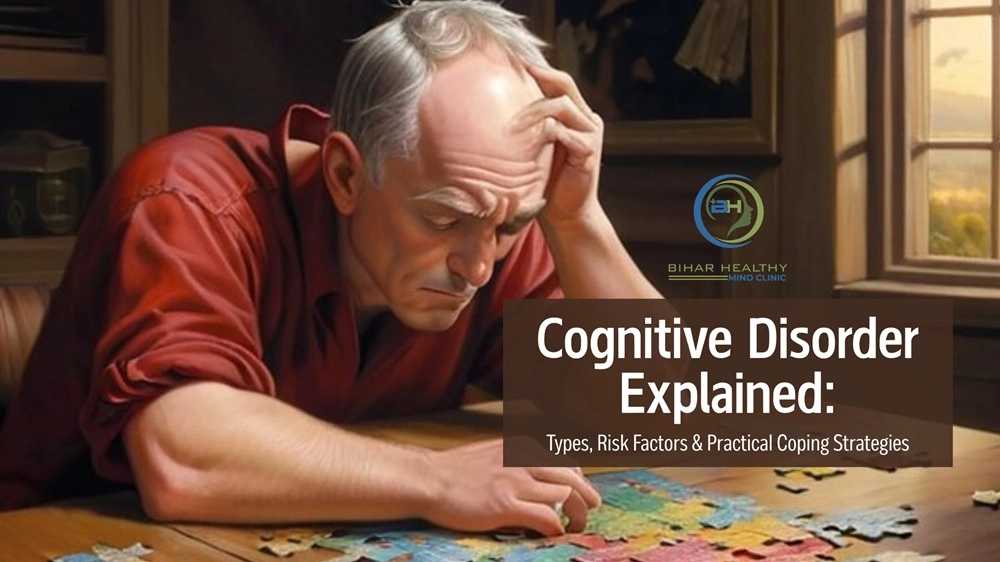
Understanding how the brain processes information is essential to understanding cognitive disorder and its impact on everyday life. Cognitive functions include memory, attention, problem-solving, language, and reasoning. When these functions become impaired, people often experience difficulties performing routine tasks, managing relationships, and maintaining emotional stability. Many individuals search for terms like cognitive disorder meaning, what are cognitive issues, or what are cognitive problems to understand what they or their loved ones may be experiencing.
At Patna Psychiatry, under the guidance of Dr. Saurabh Kumar, MD (Psychiatry), widely regarded as one of the best psychiatrists in Patna, patients receive comprehensive evaluation and treatment for various cognitive conditions.
Cognitive Disorder Meaning: What Does It Really Include?
A cognitive disorder refers to a condition that affects essential mental abilities involved in thinking, learning, memory, comprehension, judgment, and decision-making. These disorders occur when the brain’s ability to process information becomes compromised due to illness, injury, or age-related decline.
Many people confuse cognitive disorders with regular forgetfulness or temporary stress-related attention problems. However, cognitive disorders involve persistent and measurable deficits that interfere with daily functioning.
-
Common signs associated with cognitive problems include:
- Difficulty understanding instructions
- Memory lapses
- Trouble with focus and concentration
- Slowed thinking
- Poor decision-making
- Disorganized thoughts
These symptoms may vary depending on the severity and type of the underlying condition.
Major Types of Cognitive Disorders
Understanding the different types of cognitive disorders helps individuals recognize symptoms early and seek timely treatment.
Mild Cognitive Impairment (MCI)
MCI involves subtle but noticeable decline in cognitive abilities. People with MCI often struggle with memory or attention but can still manage their daily activities. It is considered a risk stage for dementia and Alzheimer’s disease.
Dementia
Dementia is one of the most well-recognized forms of cognitive disease. It involves progressive decline in cognitive abilities, memory, language, and problem-solving. Alzheimer’s disease represents the most widespread form of dementia.
Delirium
Delirium is an acute condition characterized by sudden confusion, disorientation, and impaired awareness. It often results from infections, medications, substance withdrawal, or hospitalization.
Alzheimer's Disease
A progressive brain disorder leading to severe cognitive decline. Early symptoms include forgetfulness, difficulty learning new information, and impaired reasoning.
Vascular Cognitive Impairment
Triggered by reduced blood flow to the brain, often due to stroke or small vessel disease. Symptoms include slowed thinking, planning difficulties, and reduced concentration.
Traumatic Brain Injury (TBI)-Related Cognitive Disorders
Injuries from accidents, falls, or sports can lead to long-term cognitive issues such as memory loss, impulsivity, and lack of attention.
Psychiatric Conditions with Cognitive Impairment
Depression, schizophrenia, and ADHD can cause cognitive deficits. These are considered cognitive impairment examples because they significantly affect thought processes and behavior.
Neurodevelopmental Cognitive Disorders
Conditions such as intellectual disability or learning disabilities also involve cognitive impairments present from childhood.
Common Risk Factors Behind Cognitive Issues
Many people often ask, ‘What leads to cognitive problems?’ Various elements play a role in the onset of cognitive disorders, such as:
- Age - As people get older, the risk of cognitive disease increases due to natural brain changes.
- Genetics - A family history of dementia or neurodegenerative conditions can increase susceptibility.
- Brain Injury - Accidents, falls, or concussions can cause long-term cognitive issues.
- Chronic Medical Conditions - Diabetes, hypertension, thyroid problems, and cardiovascular disease can impair brain function.
- Substance Use - Long-term alcohol or drug use can lead to memory loss and attention problems.
- Infections and Inflammation - Conditions like meningitis, encephalitis, or autoimmune disorders impact cognitive functioning.
- Mental Health Disorders - Anxiety, depression, and bipolar disorder can contribute to cognitive problems when left untreated.
- Lifestyle Habits - Poor nutrition, lack of sleep, and sedentary behavior also increase risk.
Symptoms: What Are Cognitive Issues You Should Watch For?
-
Recognizing symptoms early is crucial. Red flags include:
- Repeatedly forgetting appointments or conversations
- Getting lost in familiar places
- Difficulty processing information
- Trouble performing familiar tasks
- Slowed learning ability
- Language problems (finding the right words)
- Difficulty planning or organizing
- Reduced attention span
These signs are more than occasional confusion, they may indicate underlying pathology.
Diagnosis: How Experts Identify Cognitive Disorders
Early diagnosis can delay progression and improve outcomes significantly.
Effective Coping Strategies & Treatment Options
Treatment depends on the underlying cause. While some conditions like Alzheimer’s are progressive, others can improve substantially with timely care.
Medical Treatment
Psychiatrists may prescribe medications to manage symptoms such as memory deficits, confusion, sleep disturbances, anxiety, or depression.
Cognitive Rehabilitation
Therapies focused on improving attention, memory, and problem-solving.
Lifestyle Modifications
Counseling & Psychotherapy
Helpful for patients dealing with anxiety, depression, or behavioral issues related to cognitive impairment.
Family Education & Support
Caregivers learn strategies to communicate effectively, maintain safety, and support emotional well-being.
Treating Underlying Conditions
Correcting thyroid issues, vitamin deficiencies, or managing chronic illness can reverse or reduce cognitive problems.
When to Seek Professional Help
If you or someone you know is showing persistent signs of cognitive decline, it is essential to consult a specialist. With proper assessment and treatment, many cognitive conditions can be managed effectively.
At Patna Psychiatry, patients receive evidence-based care from Dr. Saurabh Kumar, recognized widely as a leading expert and often referred to as the best psychiatrist in Patna for cognitive and psychiatric disorders.
-
At Patna Psychiatry, evaluation includes:
- Detailed clinical interview
- Cognitive tests (memory, attention, language)
- Neuropsychological assessments
- Brain imaging (if required)
- Evaluation of lifestyle, medical, and psychological factors
- Regular physical exercise
- Brain-stimulating activities (puzzles, reading)
- Balanced diet (rich in antioxidants and omega-3)
- Quality sleep
- Stress management techniques
Visitors: 46





No comments yet.